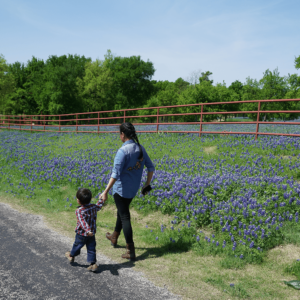 The Hogg Foundation for Mental Health is pleased to announce $4.5 million in grants to six Texas organizations to support collaborative approaches to well-being in rural communities. The grants will strengthen efforts to transform the environments where people live, learn, work, play and pray, bringing a population health approach to support resilience, mental health and well-being.
The Hogg Foundation for Mental Health is pleased to announce $4.5 million in grants to six Texas organizations to support collaborative approaches to well-being in rural communities. The grants will strengthen efforts to transform the environments where people live, learn, work, play and pray, bringing a population health approach to support resilience, mental health and well-being.
The initiative grows out of the foundation’s new strategic direction, which is shifting from a primary focus on individual mental illness to the upstream or root causes of poor mental health at the community level. It recognizes that community-based approaches are necessary to make a lasting transformation in mental health and well-being.
Five organizations were awarded $410,000 each to create or build on an existing community collaborative. The collaboratives consist of key stakeholders from across sectors, including people who have been historically excluded from community decision-making processes, who are developing and/or delivering strategies to move their community toward greater well-being. A sixth organization, Alliance for Greater Works, received grant funding to provide coordination for the initiative.
The six grantees are:
- Alliance for Greater Works (Grand Prairie) – This organization will coordinate strategy, logistics, technical assistance, shared learning and communication for the five community grantees.
- Bastrop County Cares (Bastrop County) – Bastrop County has a high degree of transportation and communication barriers due to 75 percent of residents living outside city limits, as well as multiple, recent federally-declared disasters (fires and floods). Community liaisons will engage the entire community, bringing together a Community Resilience Coalition to develop strategies aimed at improving resilience, mental health, and well-being.
- Community Action Corporation of South Texas (Brooks County) – Ranked next-to-last out of 242 Texas counties evaluated on overall health outcomes by the Robert Wood Johnson Foundation (RWJF), Brooks County has a 32 percent poverty rate. By launching the Behavioral and Health Outreach Leadership Development (BHOLD) Project, they will foster a culture of community in a 90 percent Hispanic population, create engagement across socioeconomic lines, and select one or more action strategies to improve well-being based on community input.
- Northeast Texas Community College (Morris County) – Morris County is ranked in the bottom 5 percent of Texas counties on overall health outcomes by RWJF, with overall low economic development. By employing community-based participatory research, they will identify factors that affect well-being to revitalize their community and promote resilience.
- Stephen F. Austin State University (Nacogdoches County) – With a poverty rate of 25 percent, Nacogdoches County is ranked in the bottom 6 percent of Texas counties on health factors by RWJF. By employing community-based participatory research, they will engage residents to identify community strengths and leverage them to become a trauma-informed community that emphasizes self-determined change over traditional service provision.
- Victoria County Public Health Department (Victoria County) – Victoria County is ranked in the lower half of Texas counties on physical environmental factors (which includes air and water quality, housing and transit) by RWJF, and it is still navigating the effects of 2017’s Hurricane Harvey. They will expand the Be Well Victoria Collaborative to engage local community organizations and consumers, and ensure the inclusion of traditionally excluded groups for a grass-roots approach to improving well-being.
“We were extremely impressed with the quality and innovativeness of the proposals submitted by over 60 rural communities from across the state,” said Dr. Octavio N. Martinez, Jr., executive director of the Hogg Foundation. “It was a challenge to select only five communities to embark on this new partnership.”
Not only does the new initiative focus on rural communities, but the projects are designed to ensure the participation of historically excluded groups at every crucial phase. Each grantee has considerable flexibility in developing their collaborative and approach, but all applicants had to demonstrate a commitment to shared learning, provide detailed plans for community inclusion and participation, and address the need for inclusive leadership..
“We’re not just excited about the grantees’ plans, but also the opportunity to pilot new approaches to collaboration, shared learning and technical assistance across all of the different projects,” said Tammy Heinz, project lead and program officer and consumer and family liaison for the Hogg Foundation. “The beauty of this is that as each grantee succeeds, we all raise our game.”
“This isn’t just more money to do more of the same things,” said Rick Ybarra, program officer for the Hogg Foundation. “The hope is that these grantees will pioneer new approaches to resilience, mental health, and well-being that we can all learn from.”
Learn more about the foundation’s new focus on collaborative approaches to mental health.
RELATED CONTENT
Making Mental Health a Collaborative Effort
With the rise of collaborative philanthropy comes the need to determine what makes collaboration effective. Katy Bourgeois of Mission Capital and Tammy Heinz of the Hogg Foundation talk about the complexities of collaborative work.
Strategic Focus on Communities and Collaboration
In recognition of the complex and systemic nature of the barriers to mental health, the Hogg Foundation addresses these challenges through the core strategies of Shared Inquiry, Community Implementation, and Policy Engagement.
